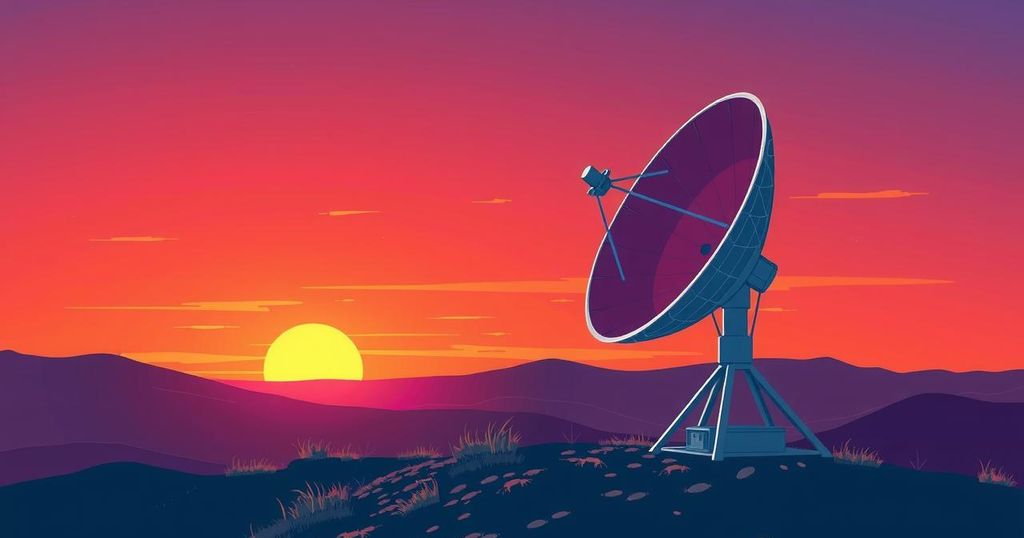Elon Musk and South Africa: The Starlink Controversy and Black Empowerment Laws
Elon Musk’s Starlink faces challenges in South Africa due to black empowerment laws requiring 30% local ownership. Musk claims racial bias obstructs operations, while the government asserts compliance is necessary. Political resistance from the ANC complicates potential reforms, amid broader diplomatic strains with the US. Starlink operates in over 20 African nations and could address internet access gaps domestically.
The conflict involving Elon Musk and South Africa revolves around the challenges faced by Starlink in launching its services in the country, primarily due to black empowerment laws. Musk claimed on social media that he was prohibited from operating in South Africa “simply because I’m not black,” but regulatory authority Icasa stated that Starlink has yet to submit a licence application. The South African foreign ministry noted that Starlink could operate if it complies with local legal requirements.
Starlink must secure network and service licenses, which necessitate 30% ownership by historically disadvantaged groups, specifically the majority black population affected by apartheid. The African National Congress (ANC), which has emphasized black empowerment since 1994, aims to rectify historical economic inequalities through such laws. Musk has indicated that he believes these legislations hinder Starlink’s ability to operate in South Africa.
Musk’s perspective has been contested by governmental officials. Clayson Monyela, a spokesperson for the foreign ministry, pointed out that numerous US companies are succeeding in South Africa by adhering to its legal framework. Communications Minister Solly Malatsi has suggested potential amendments to the laws, although he has not yet enacted any changes.
Political resistance from ANC members complicates efforts to reform these regulations. Khusela Diko, chairperson of the parliamentary communications committee, articulated that compliance with existing laws is mandatory and any shortcuts are unacceptable. The fraught political climate contributes to the ongoing tensions between the US and South Africa, particularly amid strained relations since President Donald Trump’s administration.
Musk’s criticisms have been echoed by Trump, who has engaged with the rhetoric surrounding land confiscation and ownership laws in South Africa. The president’s inflammatory remarks regarding alleged “white genocide” and land seizures, although debunked, align with Musk’s assertions and contribute to the overall diplomatic strain.
Despite a previously warm meeting between Musk and South Africa’s President Cyril Ramaphosa, relations have seemingly cooled. Both officials expressed interest in collaborating; however, Musk’s current positioning appears to align more closely with right-leaning factions in South Africa.
Starlink’s ventures extend to other African nations. Recently, Lesotho granted a ten-year licence to Starlink following pressure from US trade policies. However, civil rights groups criticized this decision, asserting it jeopardized local interests. Starlink is also pursuing regulatory exemptions in Namibia, where business ownership requirements are stringent.
Amid the growing need for internet access, particularly in rural areas of South Africa where 20% of the population is unconnected, compromises become essential. Starlink’s satellite technology could address significant gaps in connectivity and support government initiatives aimed at universal internet access by 2030.
To counteract declining relations with the Trump administration, Ramaphosa appointed Mcebisi Jonas as a special envoy to the US, acknowledging the importance of fostering strong bilateral ties. However, Jonas faces skepticism given his previous critical statements about Trump, indicating the complex dynamics that characterize US-South Africa relations today.
In summary, the ongoing conflict between Elon Musk and South Africa concerning Starlink’s operations highlights significant tensions related to local black empowerment laws. Despite regulatory opportunities for compliance, political and diplomatic hurdles remain, exacerbated by external pressures from the US. The potential for Starlink to provide high-speed internet across underprivileged areas is significant, warranting negotiations to align the interests of all parties involved. The appointment of Mcebisi Jonas signals an intent to mend diplomatic ties with the US, crucial for South Africa’s economic stability.
Original Source: www.zimlive.com




Post Comment